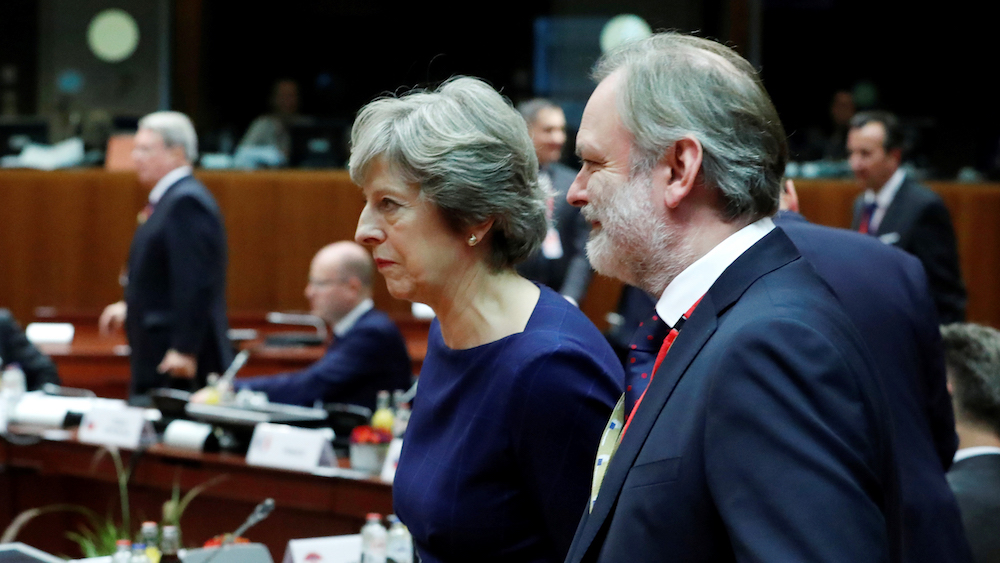British negotiators were able to convince their EU counterparts to throw British Prime Minister Theresa May a lifeline at a Brussels summit. But the continental Europeans are fed up and time is not on the UK’s side.
Returning to London after a Brussels summit on Friday, British Prime Minister Theresa May brandished a piece of paper signed by her 27 EU colleagues that she was keen to trumpet as good news. “There will be a Brexit deal in our time!” she seemed to want to declare.
The document was an assessment of the Brexit talks’ progress, in which her 27 EU counterparts said they could, in theory, start phase two of the talks – determining the UK’s future relationship with the EU after Brexit – at a summit in December. Such talks, the EU has insisted, can only start if “sufficient progress” has been made on questions for phase one – the terms of the UK’s exit.
As soon as the document was signed on Friday, May rushed downstairs to hold a press conference before any of the other leaders. The document was a “green light” for Brexit talks to move on to phase two, her advisors insisted. It was a sign, they said, that EU leaders were reacting positively to May’s Florence speech last month, in which she had made concessions and asked for a two-year transition period after the United Kingdom leaving the EU at the end of March 2019. She also wrote a letter to EU citizens in the UK last week, saying she will protect their rights, in a further effort to foster good will.
Cold Water
But as the other leaders emerged from the talks, it became clear the picture was not as rosy as May was trying to make out. Nothing really moved during this summit. The document being touted by May’s team specifically states that the UK has not made the “sufficient progress” in phase one of the talks necessary to start phase two. It merely says that such talks could theoretically start after the next summit on December 15.
In fact, all EU27 leaders were in agreement that the UK is nowhere near having made sufficient progress. Many of the leaders were already expressing skepticism on Friday that phase two talks can start in December.
“We acknowledge the openness expressed by Mrs May in Florence,” conceded French President Emmanuel Macron. “We therefore were very much willing to open a second phase of discussion, but at the same time we will only do it [if conditions are met]”.
“The ball is in Theresa May’s court,” he continued. “We are not even half way through the path. In that context, it was obvious that a lot of work remains to be done.”
The biggest sticking point is the UK’s refusal to pay for all the financial commitments it entered into while an EU member state. May increased the amount she said the UK is willing to pay at this summit. But German Chancellor Angela Merkel said that May’s new offer is still “not enough.” In short, much more will be needed in the way of concessions from the UK before the EU will start talks over giving the UK access to the EU single market once it leaves the bloc.
Walking a Tightrope
May is in an unenviable position. She has been severely weakened by her snap election defeat in June, and the other EU leaders know it. Many were referring to her at the summit as a “dead woman walking”.
She knows that leaving the EU without a deal could be an economic disaster for her country. But in order to get that deal, she will need to make concessions that are unpalatable to the hardcore Brexiteers in her own Conservative party, including her Brexit Secretary David Davis and Foreign Secretary Boris Johnson, who have clearly been eyeing taking her job since the election. Both undermined her last week by saying a “hard Brexit” – leaving without a deal – could be good for Britain, while Home Secretary Amber Rudd called such on outcome “inconceivable.”
So May has been stuck in inertia, unable to offer enough to the EU to demonstrate “sufficient progress” while the knives are out for her at home, but also unable to walk away and declare a hard Brexit to be the way forward, because it could cause companies and markets in the UK to panic.
Luxembourg’s Prime Minister Xavier Bettel likened the situation at the summit to a group of passengers waiting for a latecomer to a flight. “It’s like we’re sitting in a plane and some passengers haven’t arrived yet,” he said. “We can’t wait forever. They will have to take the bus then.”
Macron pointed out after the summer that “no deal” has never been discussed with May, casting aspersions on Johnson and Davis. “At no point has ‘no deal’ been part of official Brexit discussions,” he said. Those floating this idea are “secondary players.”
Europe now views this as a domestic UK problem, and they are waiting for the country to sort out its internal disagreements. But that doesn’t look like it is coming any time soon, given that the British Parliament’s EU withdrawal bill was delayed this week. “It can’t go on like this,” the German newspaper DIE ZEIT wrote last week. But chances are that it will.







